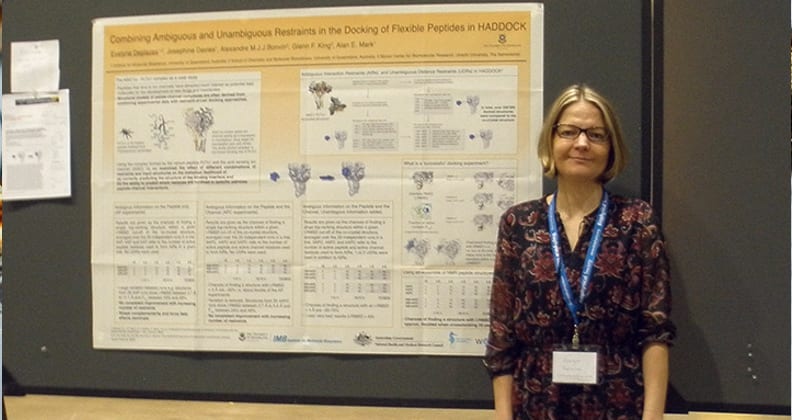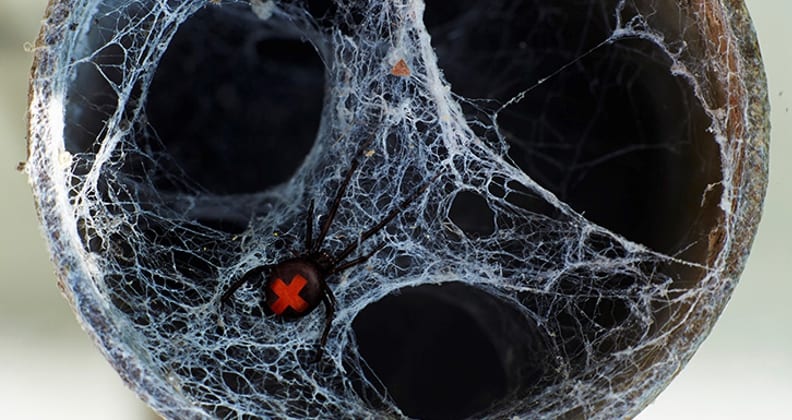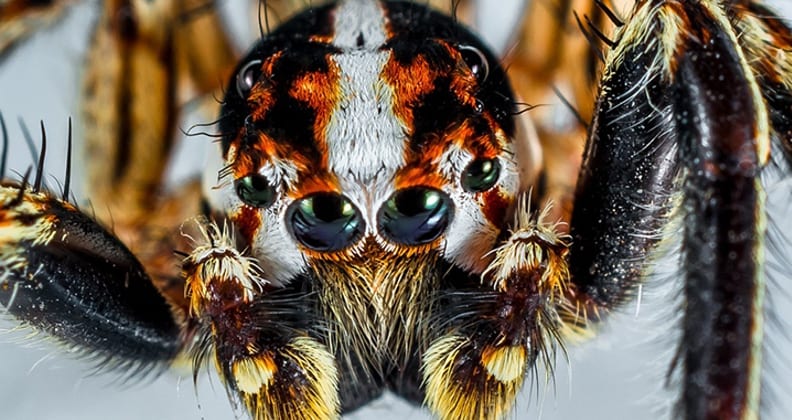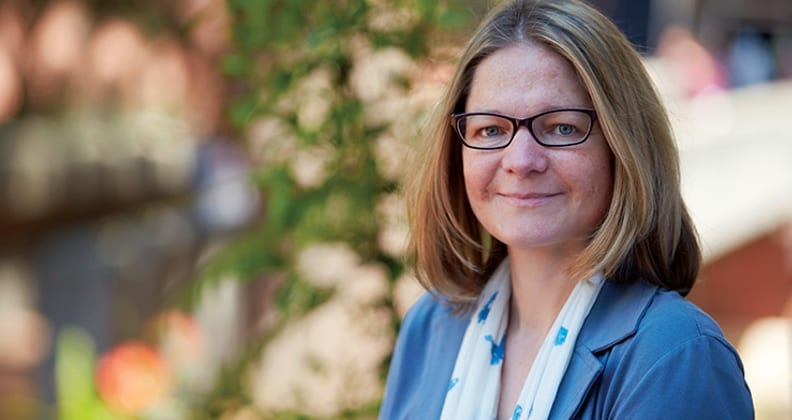The venomous ways of spiders hold a particular fascination for Dr Evelyne Deplazes, Research Fellow, School of Biomedical Sciences. While the thought of spider venom would make most people shudder, Dr Deplazes is interested in its health-giving properties, specifically its effect on cancer cells and neurological conditions.
An ever-curious mind, and a desire to understand ‘how things work’, led Dr Deplazes to a career in science. She completed her undergraduate and Honours degrees at Curtin, and returned to the University as a Research Fellow in 2016. Dr Deplazes, who was awarded the 2016 Young Biophysicist of the Year from the Australian Society for Biophysics, is also affiliated with the Curtin Health Innovation Research Institute (CHIRI).
Provide an overview of your research career to date.
I completed a double degree in Chemistry and Computer Science and an Honours project at Curtin (2003-2007). I then moved to the University of Western Australia for a PhD in Computational Chemistry (2008-2012). During that time I also spend time at the University of Gröningen in the Netherlands, and the Victor Chang Cardiac Research Institute in Sydney. After my PhD I was awarded an Early Career Fellowship by the Swiss Government, followed by a NHMRC Early Career Fellowship for postdoctoral work at the University of Queensland (2012-2016).

How long have you been at Curtin?
I returned to Curtin as a Research Fellow in April 2016. Having spent so many years as an undergraduate student at Curtin, it felt a bit like coming home. It was interesting to see all the changes on campus. I did my Chemistry degree in Building 305, which back then was the School of Chemistry, and now work in the same building as a staff member in the School of Biomedical Sciences.
Why were you drawn to academia/research as a career?
I always enjoyed science at school, in particular chemistry and biology. These days I realize it was probably not a specific subject but more the challenge of ‘solving puzzles’, and following my natural curiosity, and wanting to know ‘how things work’, that made me study science.
I was drawn to the physical sciences and its logical and numerical approach to understanding the world, but at the same time I am fascinated by the complexity of the human body. So, after my PhD, I wanted to apply my skills in computational chemistry to the field of biomedical sciences.
I also enjoy teaching students and helping them develop their own ideas. To see a student’s face when she or he has an ‘aha’ moment is rewarding.
What are your current areas of research interest/specialisation?
In general terms, I use computer simulations to study biological processes at the molecular level. That is, I try to understand how biological molecules interact with each other.
More specifically, I am interested in understanding how peptides that naturally occur in in animal venoms interact with the human body. Many of these peptides have interesting pharmacological activities that make them valuable in developing pharmacological tools and drugs.
Over the past few years, I have been working on spider venom peptides that modulate specific ion channel proteins found in our nervous systems. These proteins are involved in neurological conditions such as inflammatory pain, multiple sclerosis and ischemic strokes. Understanding how these peptides work can help us understand the molecular basis of these conditions, and develop new treatments.
In another project we study the anti-cancer activity of a spider venom peptide. It has been shown that the peptide kills cancer cells by irreversibly damaging the cell membrane, but the details of how this works remain unknown. By combining simulations and biophysical experiments, we aim to understand how the peptide’s ability to bind to membranes relates to its anti-cancer activity. This knowledge will help to make modified peptides that have an increased anti-cancer activity.

Who do you collaborate with?
I am a visiting academic at the University of Queensland, where I collaborate with Professor Glenn King, an expert in the study of spider venoms, and Professor Alan Mark, who specialises in the development of computational methods for studying biological processes. I also work with Professor Thorsten Wohland at the National University of Singapore and Dr Chris McDevitt at the University of Adelaide.
What have been the challenges and highlights of your career to date?
Being an Early Career Researcher in the current funding climate is challenging. The low success rate for research funding makes it very hard for young academics to establish themselves.
There no longer is a clear pathway towards a career in research/academia. I have seen many of my colleagues and friends leave academia; either because funding ran out, or the lack of job security, and constant moving to follow the next postdoc, was no longer compatible with their personal lives. I think we need to seriously think about how we train the next generation of researchers so that they are prepared for life outside of academic research.
The highlight of my career is the fact that I still love what I do, despite all the challenges. It is a privilege to be able to keep learning new things and share that knowledge with students. I love working in a university environment and working on projects that challenge me on a daily basis.

What are your interests outside of work?
I spend a lot of my spare time on the yoga mat. I have been practising both the physical and non-physical aspects of yoga for many years.
I find it fascinating how reading texts on yoga philosophy, written thousands of years ago, reveal the same curiosity-driven approach to studying the human body and mind that we have today. Science and technology have provided us with more sophisticated tools these days, but the essence of trying to understand human nature is still the same.
My yoga practice also helps me put things into perspective and to stay healthy. It is a constant reminder that, even in a competitive and stressful world, the smallest act of kindness can go a long way. Apart from Yoga, I love to travel all over the world to feed my curious mind.
The photos of spiders in this profile are for illustrative purposes, and are not images of the spiders used in Dr Deplazes’ research.



